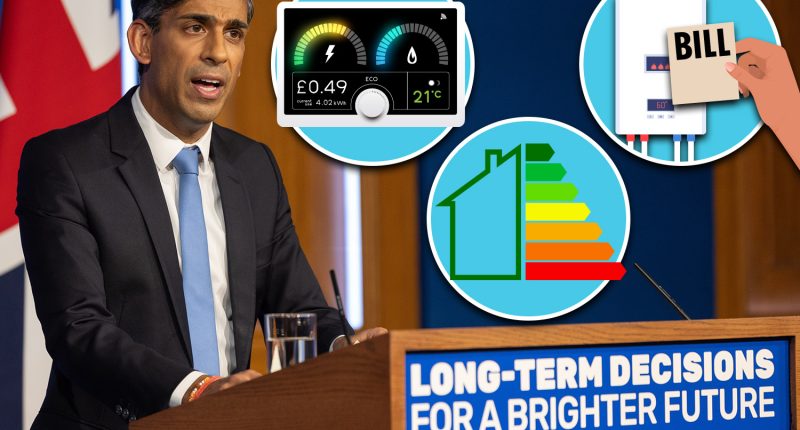RISHI Sunak has watered down efforts to tackle the climate crisis in an announcement that has faced fierce criticism.
In a speech from Downing Street, the Prime Minister said on Wednesday he would put back a ban on new fossil fuel cars by five years in a major U-turn among a raft of measures.
Mr Sunak heaped praise on The Sun for pleading with ministers not to force unaffordable green transition costs on hard-up households.
And he confirmed that households would “never” be forced to “rip-out their existing boiler and replace it with a heat pump“.
But one major policy U-turn could lead to substantially higher energy costs for renters.
Here’s exactly what his speech means for your energy bills.


Delay to ban on gas boilers
The Prime Minister announced that the ban on the installation of gas boilers into newly built homes will be pushed back from 2025 to 2035.
The phase-out of fossil fuel boilers in 2035 will still stand.
But the poorest households will also be exempt from switching to low-carbon heating alternatives past this date.
He said the Government would not force anyone to rip out their existing boiler for a heat pump, and that a new exemption would also be applied for low-income households “so that they will never have to switch at all”.
Most read in Money
The government has also pushed back her oil and LPG boiler phase-out plan from 2026 to 2035.
Boosted boiler upgrade grants
Rishi Sunak has also pledged to boost the cash grants for household boiler upgrades by 50% to £7,500
The grant is available under the boiler upgrade scheme for households installing air source heat pumps.
The grant was first launched in 2022 and is worth £5,000 or £6,000, depending on the type of heat pump.
The increase means households can get an extra £1,500-£2,500 to cover the costs.
One alternative is heat pumps, which provide a greener way to heat your home – and at a lower cost too.
But they have historically been expensive to purchase and install, costing between £5,000 and £8,000.
In total, the scheme is expected to pay for 90,000 installations and will run until the end of March 2025.
Heat pumps work like a fridge in reverse.
They take in heat from the air outside, even when it is cold, and use it to warm a liquid refrigerant to turn it into a gas.
This is then compressed and transferred to a central heating system to warm radiators.
You will need to find an MSC-certified installer to claim the grant on your behalf.
MSC is the certification scheme for energy-efficiency product installers.
You can find the nearest ones to you on the MSC website, but it is worth shopping around to get a few quotes.
Once you agree on a price, the installer will apply for the grant and you will then be contacted by Ofgem, the energy regulator, to confirm that the work is being done on your behalf.
You will need to pay the difference if the pump costs more than the grant.
While homeowners can purchase boilers from between £500 to £1,500, the Energy Saving Trust estimates that a heat pump can cost £6,000 to £8,000.
The latest increase to the grant could mean that you need to cover less of the cost, or nothing at all if it covers the full amount.
Scrapped energy efficiency targets
The Prime Minister announced he would no longer require homeowners and landlords to make “expensive insulation upgrades”.
No 10 officials said the change meant proposals to force landlords or homeowners to upgrade homes to an energy performance certificate (EPC) grade C by 2035 would not be taken forward.
While it means landlords do not have to fork out cash immediately, the move drew criticism as it could leave their renters facing costs to heat poorly insulated properties.
The National Housing Federation, which represents housing associations in England, warned that scrapping targets “could lead to people facing higher bills for years to come”.
Analysis by the Energy and Climate Intelligence Unit (ECIU) indicated that cancelling energy efficiency regulations for the private rental sector could cost households almost £8 billion in higher bills over the next decade.
National Housing Federation chief executive Kate Henderson said: “England’s homes are among the oldest and draughtiest in Europe.
“Making homes more energy efficient is a win-win, not only helping to save our planet, but also boosting our economy by creating jobs and, crucially, saving money.


“Our research found that retrofitting homes would save social housing residents on average 40% on heating bills.
“Scrapping targets on this could lead to people facing higher bills for years to come.”









